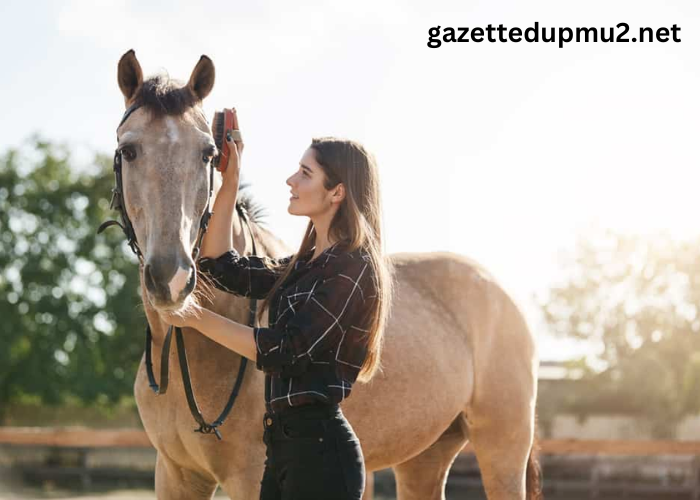Horses are majestic, intelligent creatures that require dedicated care and attention to thrive. Whether you’re a seasoned equestrian or a first-time horse owner, understanding the basics of horse care is crucial to ensuring the well-being and happiness of your equine companion. This guide covers the essential aspects of horse care, from nutrition and grooming to health management and emotional well-being. Discover the finest quality turf products at AbdellatifTurf. From lush green grass to durable turf solutions, find everything you need for your landscaping projects.
1. Nutrition: The Foundation of Health
A balanced diet is vital for a horse’s health. Horses are grazing animals and thrive on a diet that mimics their natural eating habits. The cornerstone of their diet should be high-quality forage, such as hay or pasture, which provides the necessary fiber for their digestive health.
Key Points:
- Forage: Ensure your horse has constant access to clean, high-quality hay or pasture. The amount and type of forage will depend on the horse’s age, weight, activity level, and health.
- Concentrates: Depending on the horse’s needs, supplements like grains or commercial feed can provide additional nutrients. However, overfeeding concentrates can lead to obesity and digestive issues.
- Fresh Water: Always provide access to clean, fresh water. Horses can drink between 5 to 10 gallons of water per day.
- Minerals and Vitamins: A mineral block or a salt lick can supply essential vitamins and minerals that might not be present in forage.
2. Grooming: Maintaining Cleanliness and Bonding
Regular grooming is essential not only for cleanliness but also for building a strong bond between you and your horse. Grooming helps in early detection of skin problems, injuries, and other health issues.
Key Points:
- Brushing: Daily brushing helps remove dirt, loose hair, and prevents matting. Use different brushes for different parts of the body: a curry comb for loosening dirt, a stiff brush for removing it, and a soft brush for sensitive areas.
- Hoof Care: Pick out your horse’s hooves daily to remove debris and check for signs of thrush or injury. Regular farrier visits (every 6-8 weeks) are crucial for hoof health.
- Bathing: Horses do not need frequent baths, but occasional washing with a mild shampoo can help keep their coat clean and shiny. Avoid over-bathing as it can strip natural oils from their skin.
- Mane and Tail: Regularly detangle the mane and tail using a wide-toothed comb or your fingers to prevent breakage.
3. Shelter: Providing a Safe Haven
Horses need a safe, comfortable environment to protect them from extreme weather conditions and potential hazards.
Key Points:
- Stabling: Ensure the stable is clean, dry, and well-ventilated. Regular mucking out (removal of manure and wet bedding) is essential to prevent respiratory problems and infections.
- Pasture: A well-maintained pasture provides space for exercise and grazing. Fencing should be secure and free from sharp edges that could cause injuries.
- Shelter: Provide a run-in shelter in pastures to protect horses from rain, wind, and extreme sunlight.
4. Health Management: Preventive Care is Key
Regular veterinary care and a proactive approach to health management can prevent many common equine illnesses and injuries.
Key Points:
- Vaccinations: Keep your horse up-to-date with vaccinations for diseases such as tetanus, influenza, and West Nile virus.
- Deworming: Implement a strategic deworming program based on fecal egg counts and veterinary recommendations to control internal parasites.
- Dental Care: Schedule regular dental check-ups (at least once a year) to prevent dental problems that can affect feeding and overall health.
- Exercise: Regular exercise is crucial for maintaining physical and mental health. Tailor the exercise regime to the horse’s age, breed, and fitness level.
5. Emotional Well-being: Ensuring a Happy Horse
Horses are social animals and require mental stimulation and companionship to thrive.
Key Points:
- Companionship: Horses are herd animals and do best when they have company. If possible, keep more than one horse or provide companionship through other animals like goats.
- Mental Stimulation: Provide toys, varied environments, and regular interaction to prevent boredom. Training sessions, trail rides, and other activities can keep your horse mentally engaged.
- Consistency: Establish a routine to provide a sense of security. Consistency in feeding times, exercise, and handling helps reduce stress.
Conclusion
Caring for a horse is a rewarding but significant responsibility. By providing proper nutrition, regular grooming, safe shelter, proactive health management, and emotional support, you can ensure your horse remains healthy and happy. Remember, the bond you build with your horse through attentive care and mutual respect is invaluable and will lead to a fulfilling partnership for years to come.





